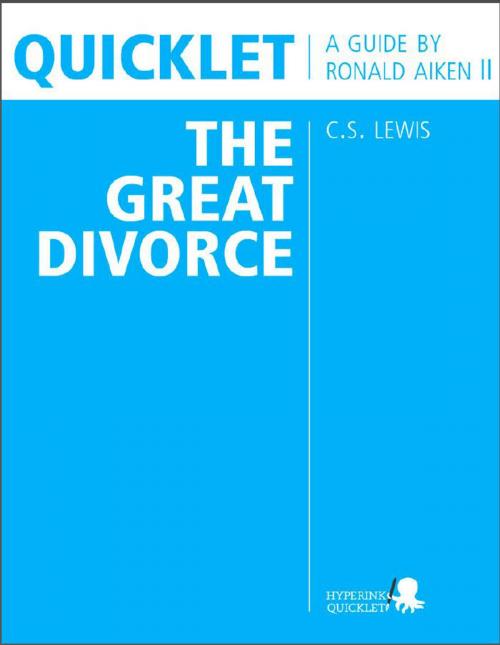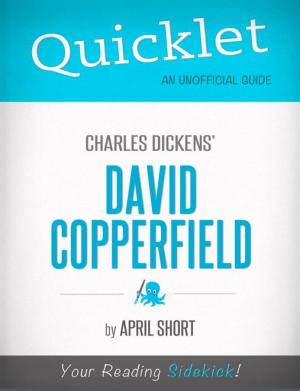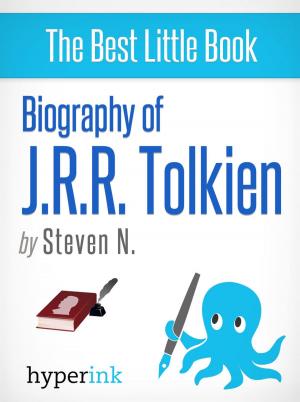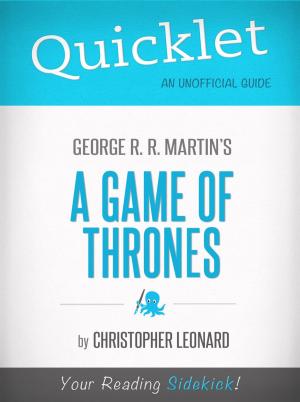Quicklet on C.S. Lewis' The Great Divorce (CliffNotes-like Book Summary & Analysis): Chapter-by-Chapter Summary and Analysis
Nonfiction, Religion & Spirituality, Christianity, Education, Fiction & Literature, Literary Theory & Criticism| Author: | The Hyperink Team | ISBN: | 9781614646112 |
| Publisher: | Hyperink | Publication: | July 31, 2012 |
| Imprint: | Hyperink - The Great Divorce Quicklet | Language: | English |
| Author: | The Hyperink Team |
| ISBN: | 9781614646112 |
| Publisher: | Hyperink |
| Publication: | July 31, 2012 |
| Imprint: | Hyperink - The Great Divorce Quicklet |
| Language: | English |
ABOUT THE BOOK
C.S. Lewis' The Great Divorce first appeared serially in the Anglican publication The Guardian in 14 installments from November 1944 to April 1945, the same publication that published Lewis' The Screwtape Letters in 1941. Influenced by Lewis' own experiences as a soldier in World War I and with World War II still raging at the time of its creation (it was written in 1943), The Great Divorce emerged at a time when the question of how a benevolent God could allow such unprecedented human suffering was on the minds of thinkers great and small.
The title refers to Romantic poet, illustrator, and author William Blake and his work, The Marriage of Heaven and Hell (1790). Both works attempt to describe, in contemporary terms, the author's conception of a Christian Heaven and Hell. For Blake, the two are married as fluid parts of the same dynamic, unified order. Lewis presents their divorce, if not from an interrelationship then from the idea that there can be an afterlife in which one enjoys the best of both "If we insist on keeping Hell (or even Earth) we shall not see Heaven: if we accept Heaven we shall not be able to retain even the smallest and most intimate souvenirs of Hell."
EXCERPT FROM THE BOOK
Feeling miserable after his conversation with the Hard-Bitten Man, the narrator is plagued with doubt, wondering if the whole business of the bus trip is merely meant, as the Hard-Bitten man implied, for the angels to mock the damned. Troubled, he journeys on to a thick wood where he spies a Well-Dressed Woman trying to hide herself from an angel. The woman is ashamed of what she's wearing compared to the angels, and despite the angel's insistence it is of no consequence, she can't relinquish her vanity. The angel then blows a loud horn that summons a herd of enormous unicorns, shaking the ground with their stampede. The woman, frightened, screams and leaves, as does the narrator.
In this chapter Lewis pokes fun at the rather flimsy vanity people (in this case a woman) cling to when they become ashamed to participate in something-even Heaven-because they don't feel they have something appropriate to wear for the occasion. "How can I go out like this among a lot od people with real solid bodies?," she asks. "It's far worse than going out with nothing on would have been on Earth. Have everyone staring through me."
Buy the book to continue reading!
Follow @hyperink on Twitter!
Visit us at www.facebook.com/hyperink!
Go to www.hyperink.com to join our newsletter and get awesome freebies!
CHAPTER OUTLINE
Background and Basics
+ About the Book
+ About the Author
+ Overall Summary
Discussion and Analysis
+ Chapter-by-Chapter Summary and Analysis
Key Information
+ Character List
+ Notable Terms and Definitions
+ Major Themes and Symbols
+ Interesting C.S. Lewis Facts
References
+ Sources and Additional Reading
C.S. Lewis' The Great Divorce
ABOUT THE BOOK
C.S. Lewis' The Great Divorce first appeared serially in the Anglican publication The Guardian in 14 installments from November 1944 to April 1945, the same publication that published Lewis' The Screwtape Letters in 1941. Influenced by Lewis' own experiences as a soldier in World War I and with World War II still raging at the time of its creation (it was written in 1943), The Great Divorce emerged at a time when the question of how a benevolent God could allow such unprecedented human suffering was on the minds of thinkers great and small.
The title refers to Romantic poet, illustrator, and author William Blake and his work, The Marriage of Heaven and Hell (1790). Both works attempt to describe, in contemporary terms, the author's conception of a Christian Heaven and Hell. For Blake, the two are married as fluid parts of the same dynamic, unified order. Lewis presents their divorce, if not from an interrelationship then from the idea that there can be an afterlife in which one enjoys the best of both "If we insist on keeping Hell (or even Earth) we shall not see Heaven: if we accept Heaven we shall not be able to retain even the smallest and most intimate souvenirs of Hell."
EXCERPT FROM THE BOOK
Feeling miserable after his conversation with the Hard-Bitten Man, the narrator is plagued with doubt, wondering if the whole business of the bus trip is merely meant, as the Hard-Bitten man implied, for the angels to mock the damned. Troubled, he journeys on to a thick wood where he spies a Well-Dressed Woman trying to hide herself from an angel. The woman is ashamed of what she's wearing compared to the angels, and despite the angel's insistence it is of no consequence, she can't relinquish her vanity. The angel then blows a loud horn that summons a herd of enormous unicorns, shaking the ground with their stampede. The woman, frightened, screams and leaves, as does the narrator.
In this chapter Lewis pokes fun at the rather flimsy vanity people (in this case a woman) cling to when they become ashamed to participate in something-even Heaven-because they don't feel they have something appropriate to wear for the occasion. "How can I go out like this among a lot od people with real solid bodies?," she asks. "It's far worse than going out with nothing on would have been on Earth. Have everyone staring through me."
Buy the book to continue reading!
Follow @hyperink on Twitter!
Visit us at www.facebook.com/hyperink!
Go to www.hyperink.com to join our newsletter and get awesome freebies!
CHAPTER OUTLINE
Background and Basics
+ About the Book
+ About the Author
+ Overall Summary
Discussion and Analysis
+ Chapter-by-Chapter Summary and Analysis
Key Information
+ Character List
+ Notable Terms and Definitions
+ Major Themes and Symbols
+ Interesting C.S. Lewis Facts
References
+ Sources and Additional Reading
C.S. Lewis' The Great Divorce















